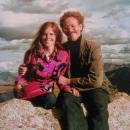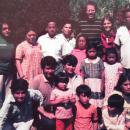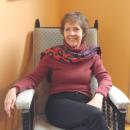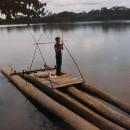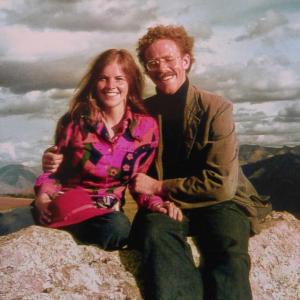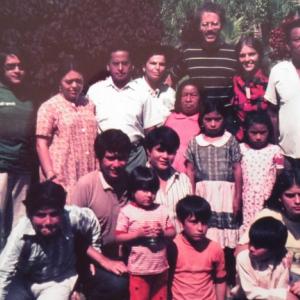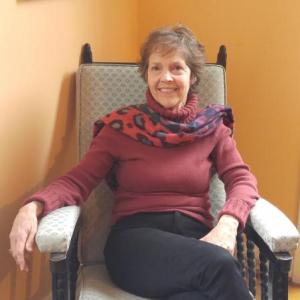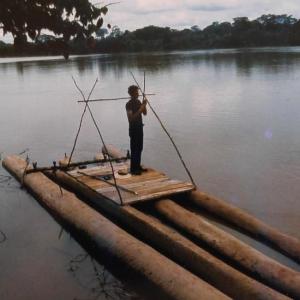Resident's book recalls honeymoon turned battle for survival
 Holly FitzGerald and her husband Fitz in the Andes Mountains. COURTESY HOLLY FITZGERALD
Holly FitzGerald and her husband Fitz in the Andes Mountains. COURTESY HOLLY FITZGERALD Holly and Fitz meet members of the Jivaro tribe in South America. COURTESY HOLLY FITZGERALD
Holly and Fitz meet members of the Jivaro tribe in South America. COURTESY HOLLY FITZGERALD Holly FitzGerald in the living room of her South Dartmouth home. BY DOUGLAS MCCULLOCH
Holly FitzGerald in the living room of her South Dartmouth home. BY DOUGLAS MCCULLOCH Fitz builds the raft. COURTESY HOLLY FITZGERALD
Fitz builds the raft. COURTESY HOLLY FITZGERALD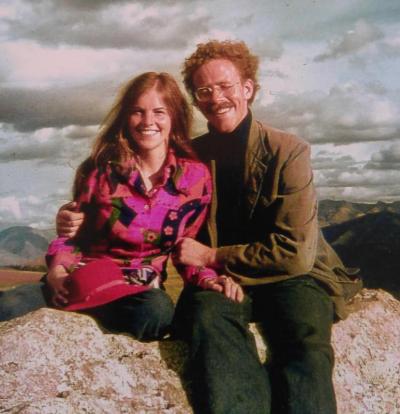 Holly FitzGerald and her husband Fitz in the Andes Mountains. COURTESY HOLLY FITZGERALD
Holly FitzGerald and her husband Fitz in the Andes Mountains. COURTESY HOLLY FITZGERALD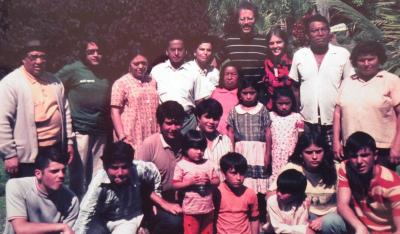 Holly and Fitz meet members of the Jivaro tribe in South America. COURTESY HOLLY FITZGERALD
Holly and Fitz meet members of the Jivaro tribe in South America. COURTESY HOLLY FITZGERALD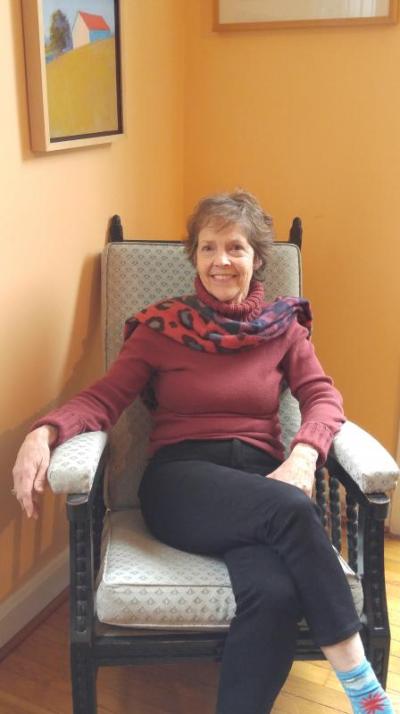 Holly FitzGerald in the living room of her South Dartmouth home. BY DOUGLAS MCCULLOCH
Holly FitzGerald in the living room of her South Dartmouth home. BY DOUGLAS MCCULLOCH Fitz builds the raft. COURTESY HOLLY FITZGERALD
Fitz builds the raft. COURTESY HOLLY FITZGERALDWhat began as an adventure of a lifetime for Dartmouth resident Holly FitzGerald and her husband Fitz turned into a struggle for survival deep in a South American swamp.
The newlyweds set off to South America in 1972 for a year-long trip around the world, but a month into their travels, the pair missed the last boat out of the remote South American village of Puerto Maldonado after escaping a plane crash.
Determined to stick to their schedule, the pair built a raft and set sail alone on the Madre de Dios for a five-day trip to their next destination, Riberalta, assured by locals that it’d be an easy trip. On the fourth night, a massive storm put the FitzGeralds off course. It triggered a months-long journey to escape the unforgiving waters and return to civilization.
FitzGerald chronicled the story of survival in her new book, “Ruthless River: Love and Survival by Raft on the Amazon's Relentless Madre de Dios,” set to launch on May 30. Dartmouth Week sat down with FitzGerald to get the scoop on her book, and what it’s like surviving against all odds.
What inspired the adventure?
Fitz and I were going out skiing in Vermont, and there was a big snowstorm that came up. We couldn’t see ahead of us, so my husband pulled over and there was a car behind us. It crashed into us. Everybody was okay, but the car was totaled. I just bought that car, a Toyota Mark II. I started thinking, what’s the point of those material things? I liked travel, so that was the start of talking about it.
When you decided to set sail on your own, did you have any idea what you were getting into?
Not at all. I wasn’t a very nautical person I guess. My husband had a little bit more trepidation, but then the harbormaster said this is the way people travel. We had a license from the harbormaster too. It was all stamped, and that made us feel more and more confident.
You’re on the raft you just built. What was it like, before everything set in?
The first few days were great. It was great out there. We enjoyed the freedom of traveling on our own without a care in the world. On the first night though we couldn’t pull ourselves to the shore on our own power. We had to keep going through the night.
Is there a memory, or a feeling, that stands out to you the most?
There were bees on us all the time. They’d just come and sit on us, all over our bodies. The only way we could get rid of them is to go in the water, but of course that had its own dangers – piranhas and snakes.
What kept you going?
We always had hope that we’d get out of there. Either Fitz had hope, or I had hope. We’d keep ourselves going, but there was always that feeling that we were trapped, and we might never get there. But we weren’t going to give up unless we starved to death. We were starving.
What was the return to the States like?
It was a thrill to come back. Obviously, you’re alive. You can’t wait to see your family, but it was also hard. You hear of culture shock when people come back from traveling just for a couple of weeks. This was even more of a culture shock, just getting used to everything again that we all are used to here. We’re used to having a nice bath or food in the grocery store. You just don’t take anything for granted.
Has the ordeal dampened your love of travel?
Not at all. I still think people should travel. It’s a wonderful way of learning about other people. I always advocate for travel.
It’s been almost forty years since the ordeal. Why write a book about it now?
My husband did want to write it a long time ago. He tried, but it was just too hard. It was too painful for him. He doesn’t like to revisit it. It was many years later – we were both working and bringing up a family – and the time came. I had breast cancer, and that made me think, "Okay, if I’m going to do it, I should do it now."
Was it hard revisiting tough memories while writing the book?
It was. I enjoyed the fun parts of being young. I wrote it as a young person. The hard parts took me quite a while to get into. But then I ended up saying, "Well, what’s half a book, right? I have to keep going." I suppose that’s a little bit of the lesson of surviving. You have to persist. You have to keep fighting. When you fight for your life, you just need to keep doing it.
Did you have any tricks to bring the memories back?
Sometimes I’d go feel the mud down on the beach. There’s some mud in the harbor, and I’d feel it and get myself into it. I really liked a sweaty hot day in the summer that no one else liked because I could really feel the jungle.













